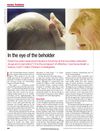 September 2020 in “Acta Scientific Cancer Biology”
September 2020 in “Acta Scientific Cancer Biology” Personalized treatment based on detailed tumor analysis successfully managed and reduced the patient's aggressive hair follicle cancer.
 1 citations,
July 2024 in “Journal of the European Academy of Dermatology and Venereology”
1 citations,
July 2024 in “Journal of the European Academy of Dermatology and Venereology” Oral dutasteride is effective and safe for treating frontal fibrosing alopecia.
 October 2024 in “American Journal of Case Reports”
October 2024 in “American Journal of Case Reports” Baricitinib improved hair loss and arthritis in a lupus patient.
11 citations,
January 2018 in “International journal of trichology” Valproate can cause hair loss and changes in hair appearance, but may help regrow hair when applied topically.
 January 2025 in “Clinical Dermatology Review”
January 2025 in “Clinical Dermatology Review” Finasteride 5 mg and topical minoxidil 5% effectively increase hair density in women, with finasteride 5 mg having the highest satisfaction.
 May 2010 in “Dermatologic Clinics”
May 2010 in “Dermatologic Clinics” The document concludes that new treatments for skin conditions are complex but effective, including spironolactone for female hair loss and propranolol for infantile hemangiomas.
 November 2023 in “Skin appendage disorders”
November 2023 in “Skin appendage disorders” Public interest in oral minoxidil for hair loss increased after a New York Times article.
8 citations,
January 2016 in “Indian Journal of Pharmacology” Finasteride and dutasteride can cause severe, lasting side effects.
 January 2016 in “Springer eBooks”
January 2016 in “Springer eBooks” Understanding drug interactions, side effects, and patient-specific factors is crucial for effective dermatological care.
 November 2024 in “Journal of Cosmetic Dermatology”
November 2024 in “Journal of Cosmetic Dermatology” Valproic acid microemulsions improve skin delivery compared to regular solutions.
 October 2023 in “Journal of The American Academy of Dermatology”
October 2023 in “Journal of The American Academy of Dermatology” Taking a small dose of the hair growth medicine minoxidil by mouth does not really change your blood pressure.
August 2017 in “Journal of the Dermatology Nurses' Association” Latisse (bimatoprost 0.03%) is widely used in dermatology but the document doesn't give detailed evidence or numbers.
 June 2024 in “JEADV Clinical Practice”
June 2024 in “JEADV Clinical Practice” Severe alopecia areata patients have a low chance of spontaneous hair regrowth.
 January 2024 in “Journal of the Egyptian Women's Dermatologic Society (Print)”
January 2024 in “Journal of the Egyptian Women's Dermatologic Society (Print)” Combining minoxidil with dutasteride and microneedling is more effective for female pattern hair loss than just dutasteride and microneedling.
 October 2024 in “JAAD Case Reports”
October 2024 in “JAAD Case Reports” Dutasteride mesotherapy showed mixed results and is not recommended as a primary treatment for hair loss.
 2 citations,
May 2021 in “European medical journal”
2 citations,
May 2021 in “European medical journal” Botulinum toxins are safe for various medical and cosmetic uses, but more research is needed for long-term safety and effectiveness in hair growth treatments.
 35 citations,
May 2012 in “Expert Opinion on Pharmacotherapy”
35 citations,
May 2012 in “Expert Opinion on Pharmacotherapy” The document concludes that there are various treatments for different types of alopecia, but more research is needed for evidence-based treatments.
 5 citations,
January 2021 in “Inflammatory Bowel Diseases”
5 citations,
January 2021 in “Inflammatory Bowel Diseases” Tofacitinib improved ulcerative colitis, skin ulcers, and hair loss in a patient who didn't respond well to other treatments.
 4 citations,
November 2023 in “Frontiers in immunology”
4 citations,
November 2023 in “Frontiers in immunology” New treatments targeting T-cell pathways are needed for better alopecia areata management.
 July 2015 in “Cambridge University Press eBooks”
July 2015 in “Cambridge University Press eBooks” The document concludes that treatments for female hair loss and excess body hair are available, but managing expectations is important.
 42 citations,
August 2013 in “International Journal of Women's Health”
42 citations,
August 2013 in “International Journal of Women's Health” Female pattern hair loss is caused by multiple factors and while treatments like topical minoxidil, hormone therapy, and low-level light therapy can help, none can fully cure it.
 28 citations,
August 2003 in “Nature”
28 citations,
August 2003 in “Nature” Cosmeceuticals may have potential but their effectiveness and market success are still uncertain.
August 2022 in “International Journal of Dermatology” Low-dose oral and sublingual minoxidil seem safe for children with hair disorders.
 1 citations,
January 2023 in “Research Square (Research Square)”
1 citations,
January 2023 in “Research Square (Research Square)” A woman's vitiligo improved with tofacitinib treatment, and her skin color remained even after stopping the medication, but there are concerns about cancer risk.

Polycystic ovary syndrome (PCOS) affects about 10% of women, is often linked to obesity and family history, and can cause irregular periods, fertility issues, and other symptoms. It's usually managed with lifestyle changes, weight loss, and medication.
 2 citations,
July 2023 in “Obstetrics & Gynecology”
2 citations,
July 2023 in “Obstetrics & Gynecology” Imiquimod may be a better non-surgical treatment for cervical pre-cancer, but its effectiveness for vaginal pre-cancer is unclear, and it has some side effects.
 March 2020 in “StatPearls”
March 2020 in “StatPearls” Medicines called 5-alpha-reductase inhibitors, like finasteride and dutasteride, are useful for treating enlarged prostate and male pattern hair loss.
 2 citations,
August 2016 in “British Journal of Clinical Pharmacology”
2 citations,
August 2016 in “British Journal of Clinical Pharmacology” The document concludes that women should not use 5-alpha-reductase inhibitors due to the risk of birth defects and limited effectiveness.
 6 citations,
April 2016 in “PubMed”
6 citations,
April 2016 in “PubMed” The review found that women using hair loss drugs like finasteride and dutasteride rarely reported sexual side effects.
 November 2024 in “Journal of Family Medicine and Primary Care”
November 2024 in “Journal of Family Medicine and Primary Care” 5 alpha reductase inhibitors can cause sexual, cognitive, and muscle side effects, and may slightly increase aggressive cancer risk.

























